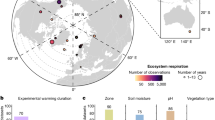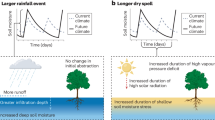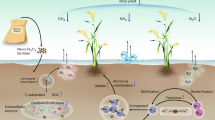Abstract
PREVIOUSLY, Mack and Barber1 found that phosphorus fractions in soils are affected by freezing. They showed that more water-soluble phosphorus was released from soil which had been previously frozen at − 20.5° C. than from one incubated at 2.7° C. To examine the effect of temperature (from + 24 down to − 196° C.) on nitrate release a brown forest soil (Grenville silt loam) having an organic matter content of 5.6 per cent was selected. The soil was sampled in the field and stored in a moist state in a controlled temperature room at + 1° C. until required for three experiments.
This is a preview of subscription content, access via your institution
Access options
Subscribe to this journal
Receive 51 print issues and online access
$199.00 per year
only $3.90 per issue
Buy this article
- Purchase on Springer Link
- Instant access to full article PDF
Prices may be subject to local taxes which are calculated during checkout
Similar content being viewed by others
References
Mack, A. R., and Barber, S. A., Soil Sci. Soc. Amer. Proc., 24, 381 (1960).
Author information
Authors and Affiliations
Rights and permissions
About this article
Cite this article
MACK, A. Low-Temperature Research on Nitrate Release from Soil. Nature 193, 803–804 (1962). https://doi.org/10.1038/193803a0
Issue Date:
DOI: https://doi.org/10.1038/193803a0
This article is cited by
-
An investigation into the possible changes in the microbial population of soils stored at ?15�C
Plant and Soil (1964)
-
Effect of Freezing of Soil on Denitrification
Nature (1962)
Comments
By submitting a comment you agree to abide by our Terms and Community Guidelines. If you find something abusive or that does not comply with our terms or guidelines please flag it as inappropriate.



